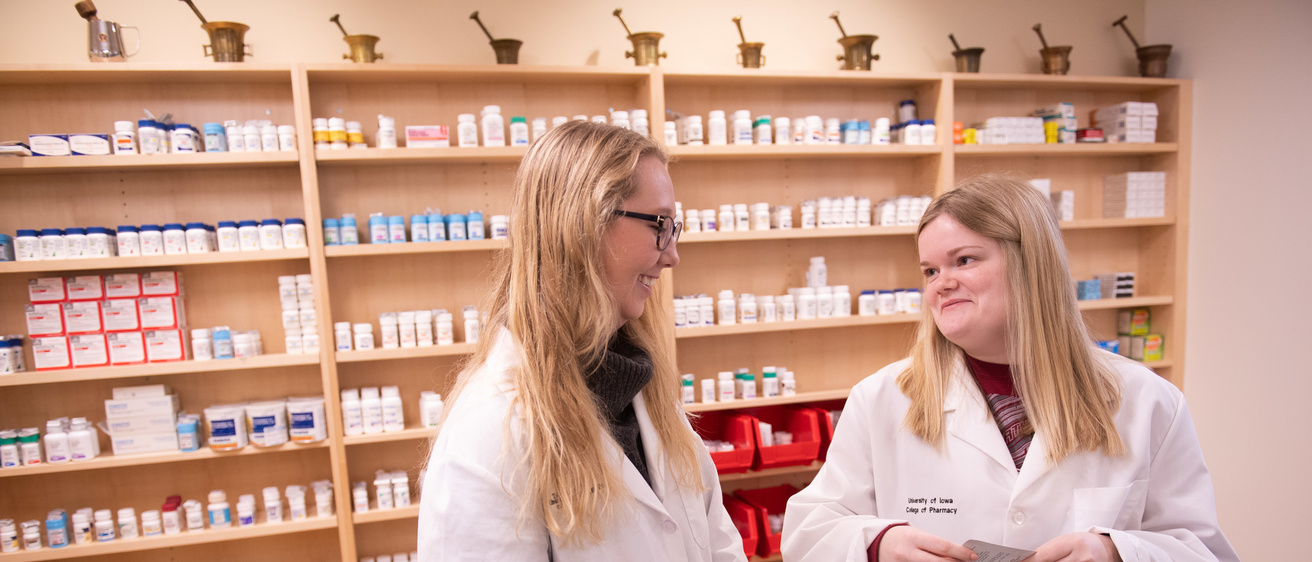“When community pharmacies work closely with patients, good things happen.”
-William Doucette, Deborah K. Veale Professor in Health Care Policy
The state of Iowa is comprised of numerous rural areas and small towns pepper the counties. A visit to a primary care doctor or urgent care center often involves a lengthy drive. For many residents living in such medically underserved areas, their pharmacist is a main health care contact. And when patients have chronic conditions putting them at risk for heart disease – the leading U.S. cause of death for men and women – it only makes sense for pharmacies to play a greater role.
The University of Iowa College of Pharmacy, in partnership with Community Pharmacy Enhanced Services Network (CPESN) Iowa, is helping 26 Iowa pharmacies improve cardiovascular health and care of patients by more closely monitoring diseases linked to heart attacks and strokes. A grant from the Centers for Disease Control and Prevention, overseen by the Iowa Department of Public Health (IDPH), is fueling the effort and methods used to align with the Flip the Pharmacy initiative funded by the Community Pharmacy Foundation.
“When community pharmacies work closely with patients, good things happen,” said William Doucette, Deborah K. Veale Professor in Healthcare Policy, who is spearheading the research in the Pharmacy Practice and Science Department.
Changing Workflow Practices
Flip the Pharmacy is a CPESN USA practice transformation project that aims to “flip” community-based pharmacies processes and business models away from point-in-time, prescription-level care to longitudinal and patient-level care.
“The idea is to change workflow practices to accommodate a number of different patients and really improve health outcomes,” said Lindsey Ludwig, CPESN Iowa executive director. Independent and small-chain pharmacies make up CPESN’s membership.
The Cardiovascular Practice Transformation (CPT) Program, which began in October, is embedded into the fourth two-year Flip the Pharmacy cohort CPESN Iowa has implemented. During a six-month period, pharmacies in the CPT program will identify and monitor 10 patients with at least one of three conditions: hypertension, diabetes, and high cholesterol.
“There are two ways to change how work is done in a pharmacy,” said Doucette. “Learning and feedback.”
In the learning realm, Doucette, Clinical Associate Professor Stevie Veach, and graduate student Arwa Al-Khatib are creating “change packages” specific to the CPT grant for pharmacies to follow. These instructional documents are part of the Flip the Pharmacy framework. Research Associate Scott Egerton also is involved with the CPT grant. Each change package focuses on one of five domains:
- medication synchronization
- patient follow up and monitoring
- nonpharmacist staff support
- using technology and e-care plans
- collaboration among team members
Real-Time Data
Feedback comes in the form of viewing data and peer coaching. New with the CPT program is the use of online application JotForm to submit brief patient-encounter reports.

Drilling Pharmacy is one of 26 Iowa pharmacies participating in the Cardiovascular Practice Transformation Program to change workflow practices and improve patient health.
“The IDPH reporting process was duplicative and time consuming,” said Doucette. “Our Jotform focuses on a range of limited data needed to assess what was done for patients over time.” Doucette added that such longitudinal data is more helpful for educating patients, follow up, and transforming a pharmacy’s practice.
Pharmacist Sarah Sorensen of Sioux City’s Drilling Pharmacy agreed.
“I love using the Jotform,” said Sorensen, whose pharmacy completed Flip the Pharmacy cohort one before signing up for the CPT program. “It saves time and the data is more clear and concise.”
Complementing the tool is a new dashboard through Google Data Studios that provides real-time information from the initial data reported through Jotform. Enrolled pharmacies can see not only where they are in implementation, but also their peers. “The dashboard is a motivator,” said Sorensen.
It’s also important for peer coaches – expert pharmacists who help Flip the Pharmacy participants with goal setting, providing resources, modifying workflow processes, training staff, and more. After the CPT program is completed, Flip the Pharmacy will continue providing coaching and support as pharmacies’ work on changes to address opioid abuse or misuse, immunizations, and health social factors.

“The most important piece of coaching is that it’s individualized,” said Ludwig, a coach herself. “Having current data allows more timely feedback and greater improvement.”
From there, a new business model can emerge.
“Our staff is now more comfortable performing clinical tasks through Iowa’s statewide protocol,” said Sorensen. “Technicians can assess patients in need of immunizations and follow up with them. This frees up pharmacists. It also eliminates a barrier between techs and patients. Patients are more comfortable talking with more staff members.”
Collaboration is a hallmark of Flip the Pharmacy, whether between patients and pharmacists, coaches and pharmacies, or among the College, CPESN Iowa, and the IDPH.
“We have a great relationship will Bill (Doucette) and the College of Pharmacy team,” said Ludwig. “He’s been open to ways to maximize the potential and engagement through the grants.”
And that’s important for Iowans.
“Ultimately, our patients’ cardiovascular outcomes are going to be better,” said Sorensen.
